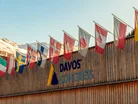World Bank CEOs in Private WEF Fintech, Global Economy Talks

World banking leaders in attendance at the World Economic Forum (WEF) in Davos, Switzerland, have met in private to discuss the growing competition they face from fintech firms and neobanks, the difficulties of burdensome regulations and a challenging economic climate.
Per Reuters, CEOs in attendance at the meeting included JP Morgan Chase’s Jamie Dimon, with the session led by Manulife’s Roy Gori and Barclays CEO C.S. Venkatakrishnan.
World banks feeling the heat from fintechs
Hot on the agenda were concerns about the rising threat neobanks and fintechs pose to incumbents, as they chip into market shares in key geographies – the US and Europe included.
FinTech Magazine drew the battle lines for fiercer competition between banks and neobanks in our January 2024 edition, where Kin + Carta Europe’s Financial Services Director, Phillip O’Neill, told us leading financial institutions must “digitise across their value chains” if they are to stave off the growing challenge of neobanks.
This need has arisen as banks continue to scale back their in-person presence in towns and cities, closing bank branches in a bid to meet the demands of more digitally-enabled customers.
For now, though, as legacy banks continue their transformation journeys, it is neobanks winning the race for customer satisfaction.
Overcoming onerous regulations
Of course, it is not just the rise of neobanks and fintechs causing headaches for the world’s leading banks; regulations are leading to mass uncertainty for leading executives.
In July 2023, the US Federal Reserve announced its proposal to hike capital requirements for major banks to ensure their protection against potential losses.
Introduced as a reaction to the collapse of several leading US banks last year (including Silicon Valley Bank), the bill – known as “Basel Endgame” – would see banks need to increase cash-like assets to a higher threshold, helping them remain liquid in the event of any future emergencies such as the recent COVID-19 pandemic.
Now, financial leaders are concerned about the impact such measures would have on the economy. Earlier this week, Wall Street banks urged the Federal Reserve to overhaul its draft ruling in favour of a watered-down version that would mitigate the implications of additional capital reserves.
Leading banks have always attested that increased capital requirements hamper their ability to be competitive and restrict their lending capabilities.
Indeed, at the WEF, UBS Chairman Colm Kelleher told Bloomberg that regulators should focus their capital-raising efforts on shadow lenders – organisations that aren’t subject to the same stringent requirements as banks, and firms that Kelleher feels are more likely to cause the next financial crisis.
Global economic uncertainty
Against the backdrop of these pressing issues for banks remains, of course, global economic uncertainty. Further volatility in global forex (FX) rates is expected in H12024 at the very least, as quantitative tightening continues to pinch the economy’s money supply.
This outlook could alter too, should change occur in the geopolitical landscape. The US and European Union will hold key elections in 2024 which could have implications for political alliances and global trade.
In Convera’s global outlook report for 2024, produced in partnership with FinTech Magazine, it is said that “the impact of elections on the economy is arguably more unpredictable than ever”, such is the current polarity in political spheres.
The effect this could have on global banks, therefore, remains unclear. But it will certainly cause greater concern for financial leaders meeting at this year’s WEF.
**************
Make sure you check out the latest edition of FinTech Magazine and also sign up to our global conference series – FinTech LIVE 2024.
**************
FinTech Magazine is a BizClik brand.
- GCC's Sustainable Finance Leap Fuels Economic RenewalSustainability
- Davos 2025: Leading the Intelligent Age DiscussionSustainability
- Airwallex Expands into LatAm with Dual Market EntryFinancial Services (FinServ)
- Banking Circle Makes Major Australia Play with ASL BuyoutFinancial Services (FinServ)


